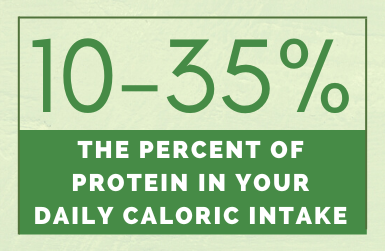Protein Essentials
Protein is a major macronutrient that is an essential part of our diet, it provides our body with energy and functions in tissue growth and repair, metabolic processes, immune system support, and helps to maintain lean muscle mass, which is important for proper body composition and burning excess fat rather than promoting muscle wasting. Adding protein to meals and snacks also provides our body with satiety so that we feel satisfied after eating without overeating excessive calories.
The average healthy adult generally needs 0.8-1.0 g/kg body weight of protein each day. Protein needs will vary depending on activity level and health conditions. Use the worksheet below to discover your body weight in kilograms.
Pounds to Kilograms Converter
Enter your weight in the Pounds field to convert it to kilograms.
There is a lot of buzz over protein lately, especially with advertisements for thousands of different protein products that promote supplements, shakes, and bars that can be very pricey. It may be tempting to purchase these products, especially since they are heavily marketed by active and in-shape people like personal trainers and athletes. But is it really necessary? Here are some tips to help you determine if protein supplements should be considered in your diet.
1. Establish a Baseline

Calculate your protein needs (see above) and track your intake for one week. Does your protein intake fall within that range? If so, you do not need to purchase protein supplements! It is preferred that you consume your protein with foods in a balanced diet – such as lean meats, seafood/fish, dairy products, beans, eggs, nuts/seeds, and legumes.
2. Adding Protein
If you determine that your protein intake could use a boost, consider incorporating more protein-rich foods in your diet in your meals and snacks.
3. Protein Supplements
If you are still struggling to meet your protein intake or have increased needs, protein supplements may be something to consider. Some prefer using a protein supplement as part of their breakfast as an easy option that does not have much prep work in the morning. Refer to the chart below for considerations when choosing a protein supplement.
Things to remember:
- Protein supplements should not be your primary source of protein every day! You should limit your protein supplement intake to once per day to allow for other dietary sources of protein to be consumed daily that are highly bioavailable.
- Do not regularly replace meals with protein supplements. If you replace entire meals with these products consistently, you are not allowing for balanced meal intakes that include a variety of nutrients like carbohydrates, fiber, fat, and a variety of fruits/vegetables that provide vitamins and minerals.
- When consuming protein supplements, consider ways to make it more nutrient-dense. Eat a piece of fruit or some raw veggies with it, lend in some vegetables and fruits, or add a tablespoon of nut butter or some avocado to provide some healthy fat. Remember, we are most satisfied after consuming a balance of macronutrients at each meal and snack!

Brianna Fait, MS, RD, LDN | brianna.fait@hcsgcorp.com
“I enjoy being a dietitian because I love helping others and showing them how powerful food can be! When you feel good, you spread good. Our world needs more of that!”
Brianna became a dietitian after realizing the importance of nutrition after battling an eating disorder when she was younger. She enjoys helping others reach their nutrition goals so that they can optimize their health and enjoy life. Prior to working for HCSG, she worked as an Outpatient Dietitian in a bariatric clinic to help patients adopt healthy lifestyle changes that are needed before and after surgery in order to be successful. Brianna also believes food is meant to be enjoyed – which is why she enjoys working with her residents to accommodate their food preferences while also meeting their health and healing goals. When not at work, you can find Brianna spending time in the kitchen, going for a run outside, catching a class at a local fitness studio, traveling, or hanging out at home with her boyfriend and their two dogs.



